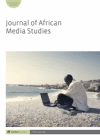- Home
- A-Z Publications
- Journal of African Media Studies
- Issue Home
Journal of African Media Studies - Current Issue
Volume 16, Issue 1, 2024
- Articles
-
-
-
Meme-ing Malawi’s 2019 presidential election: Humour, hope and disillusionment
More LessAuthors: Emmanuel Ngwira and Lester Chisale BrightonOn 21 May 2019, Malawi went to the polls to elect leaders in what turned out to be highly contested presidential, parliamentary and local government elections. Compared to previous elections, the 2019 tripartite elections also featured highly on social media. Focusing on the presidential election, this article analyses how these elections were depicted in popular imagination particularly in internet memes. Our contention is that the internet memes, and by extension, other popular art forms of that period, constitute a humorous, but highly significant documentation, of the key events of that election. The memes reflect hopes, aspirations and disillusionment that characterized the 2019 polls. In terms of conceptual framework, we draw on the theory of visual rhetoric alongside scholarship on internet memes as both humour and political discourse.
-
-
-
-
Community radio and post-conflict peace building: A study of Orisun 89.5 FM in Ife–Modakeke, Osun State, Nigeria
More LessAuthors: Silas Oghenemaro Emovwodo, Mahfouz A. Adedimeji, Muhammad Saud and Rachmah IdaIn times of conflict or tragedy, radio is essential, especially in underdeveloped nations where the collapse of other communication infrastructure may make radio the sole dependable source of information. This study assessed the extent to which community radio has contributed to the peacebuilding efforts after the Ife–Modakeke conflict in Nigeria, by investigating to ascertain listeners’ perceptions and adoption of the alternative dispute resolution (ADR) mechanism in managing the conflict to avoid a violent escalation. The study applied in-depth interviews and collected data with questionnaires. The findings of the study suggested that the inhabitants of Ife and Modakeke listened intensely to and were aware of the conflict resolution programme on one of the popular radio stations, Orisun 89.5 FM. People also used and knew others, who used the radio programme ‘ADR mechanism’ on the radio to resolve the conflict and avoid violent escalation. Since it was the only peacebuilding programme, the study found that this radio programme was an effective peacebuilding tool in the Ife–Modakeke society. The study recommended that such a good effort should be broadcast more often for further heightened awareness of its diverse listeners.
-
-
-
Attitudes of the audience towards media messages on face mask use regarding the COVID-19 pandemic: From compliance to slacking
More LessThe study focused on the transition from compliance to slacking in the audience’s attitudes towards media messages encouraging the use of face masks to avoid COVID-19. It employed the survey and multimodal analysis designs based on the Elaboration Likelihood Model (ELM). A sample of the messages on the Nigeria Centre for Disease Control (NCDC) website and YouTube were chosen for the multimodal analysis using purposive sampling. Findings showed that social media was one of the ways that most respondents commonly heard or saw messages about using face masks. Though short-term positive attitude and compliance were found, it mainly became inconsistent over time, despite the media blitz on the benefits of masking up. It recommended that there was an urgent need to re-contextualize media messages on using face masks by adopting a bottom-up strategy and a hybrid of communication approaches.
-
-
-
Upsetting the gender imbalance in African popular music: The example of Diepreye Osi of the Ịjọ (Ijaw) of Nigeria
More LessFor sometime now, there has been a conversation among scholars about male hegemony in African popular music and how some women performers resist the established status quo. In joining the discourse in this article, I focus on the owigiri music of Diepreye Osi, a female bandleader among the Ịjọ of Nigeria’s Niger Delta region. With particular attention to the departments in the bands of that premier neo-traditional music in the Ịjọ community, including instrumentation, dancing and singing, I argue that Diepreye contests patriarchy in her musical ensemble. Data for the study was gathered from unstructured interviews of artists and non-artists, and observation of live performances.
-
-
-
Keeping the Port of Tema afloat during COVID-19: Media responses to user informational and conversational needs
More LessTwo different media platforms played a key role in keeping Tema Port in Ghana afloat during the period immediately leading up to and during the three-week COVID-19 pandemic-related lockdown in late March–April of 2020. The one media platform, Eye on Port, is a weekly broadcast television show by the port’s authorities, which caters primarily to external commercial stakeholders of the port. The other platform is a closed WhatsApp forum used by stakeholders working at the operational level of the port. Both platforms served specific needs among their users, who had been restricted in their mobility but had to keep the port operational. Combining ‘scalable sociality’ with the concept of polymedia, we identify how the two media functioned to meet the different informational and conversational needs of their respective users. We argue that either medium alone could not fulfil the communicative needs necessary to keep the port operational during the early stage of the COVID-19 pandemic.
-
- Film Review
-
-
-
The Milkmaid, Desmond Ovbiagele (dir.) (2020), Nigeria: Danono Media
More LessReview of: The Milkmaid, Desmond Ovbiagele (dir.) (2020), Nigeria: Danono Media
-
-
- Book Review
-
-
-
Incompleteness: Donald Trump, Populism and Citizenship, Francis B. Nyamnjoh (2022)
More LessReview of: Incompleteness: Donald Trump, Populism and Citizenship, Francis B. Nyamnjoh (2022)
Bamenda: Langaa RPCIG, 395 pp.,
ISBN 978-9-95655-287-0, p/bk, £39.60
-
-
Most Read This Month Most Read RSS feed


